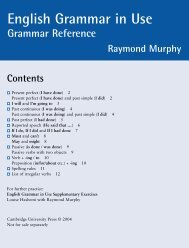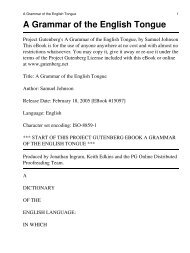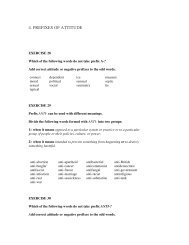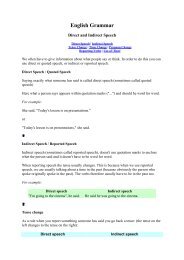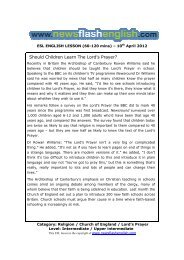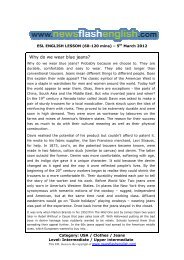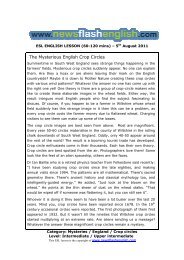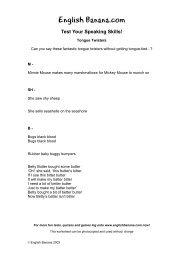TO DOWNLOAD - 75 Pages (928kb - PDF format) - ESL Teachers ...
TO DOWNLOAD - 75 Pages (928kb - PDF format) - ESL Teachers ...
TO DOWNLOAD - 75 Pages (928kb - PDF format) - ESL Teachers ...
You also want an ePaper? Increase the reach of your titles
YUMPU automatically turns print PDFs into web optimized ePapers that Google loves.
GRAMMAR2. The girls were irritated at our referring to the old fraternityall evening.3. Your car-pooling can help rid the city of gridlock.4. Edna began to feel embarrassed at his jumping intoevery conversation and immediately monopolizingit.5. Our letting Brock eat table scraps from the table produceda spoiled animal.6. Your sponsoring our son will not be forgotten.7. My getting married should have no impact on you.8. He feit strongly that he did not have to explain hisenlisting in the Navy to anyone.9. Their treating of oil as the only economical source ofenergy has brought us to a critical state of dependence.10. Her brushing her hair every night has certainly madea difference in her appearance.11. Her knowing that he did not have much money, yetordering prime rib and lobster tails, was an exampleof raw greed.12. Mary thinks his chewing gum is the reason he didnot get the part.13. Her losing her wallet started off a very bad day.14. The whole city was shocked by his refusing to takethe oath,35. My taking lunch to work every day has saved hundredsof dollars so far.13B Demonstrative pronounsDemonstrative pronouns (this, that, these, those) take theplace of things being pointed out.EXAMPLES:These are Mary's.( don't like this.They are called demonstrative adjectives when usedbefore nouns: These seats are comfortable.INCORRECT:Them are the new watches I ordered.CORRECT:Those are the new watches i ordered.(Demonstrative pronoun)Do not substitute a personal pronoun for a demonstrativepronoun or a demonstrative adjective.INCORRECT:Look at them diamonds!CORRECT:Look at those diamonds! [Demonstrative adjective]13C Interrogative pronounsInterrogative pronouns (who, whom, whose, which, andwhat) are used in questions. Who, which, and what areused as subjects and are in the nominative case. Whose isin the possessive case. Whom is in the objective case,and, like all objects, it is the receiver of action in the sentence.The most common error involving interrogative pronounsis the tendency to use who instead of whom.1. When the pronoun is receiving the action, the objectiveform whom must be used.INCORRECT:Who did you contact?CORRECT:Whom did you contact? (You did contact whom?)2, When the pronoun is performing the action, the nominativewho must be used.INCORRECT:Whom did you say is running the dance?CORRECT:Who did you say is running the dance?[Who is the subject of is running.)13D Relative pronounsRelative pronouns (who, whom, whose, which, what, andthat) refer to people and things. When a relative pronounis the subject of a subordinate clause, the clause becomesan adjective modifying a noun in the sentence.EXAMPLE:The rumor that plagued him all his life was a lie.{That plagued him all his life modifies rumor.)Which and that can also act as conjunctions to introducesubordinate clauses.EXAMPLE:Bob knew that Boston would win.Remember that the case of a relative pronoun is establishedby its function inside its clause:Aimee is the girl who needs your advice. [Who isthe subject of the verb needs within the clause.)Coach Shanks is the person whom we must thank.[Whom is the object of must thank within theclause.)You can give the relief supplies to whomever youchoose. (The noun clause is the object of tfiepreposition to; whomever is the object of the verbchoose within the clause.)Do not let intervening parenthetical expressions like "/imagine " or "for sure" mislead you.There are some customers whom, I would guess,you can never please.For sure, whoever comes first is very welcome.26




